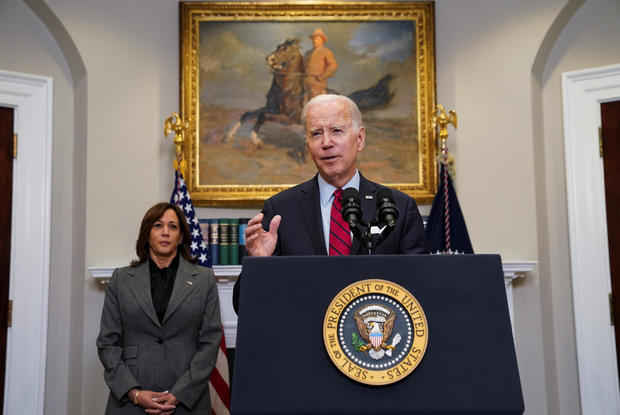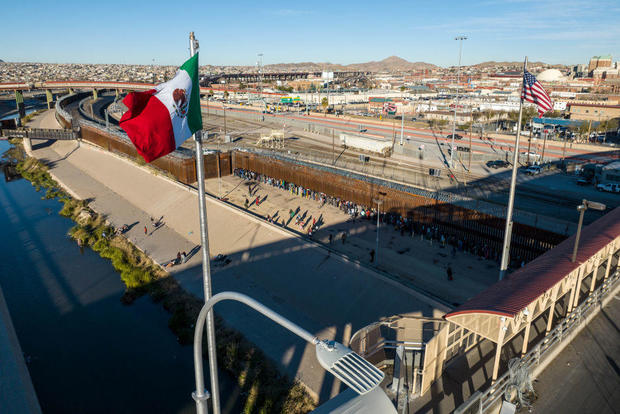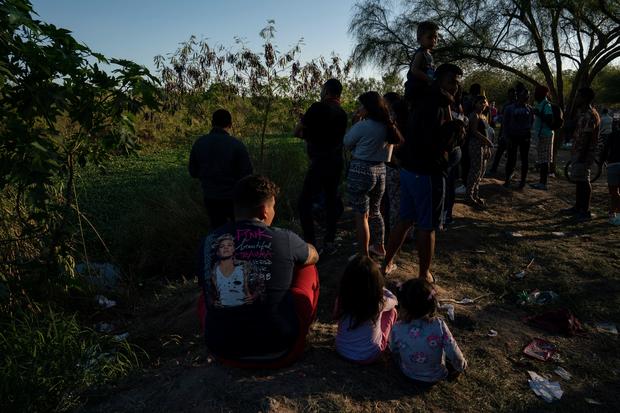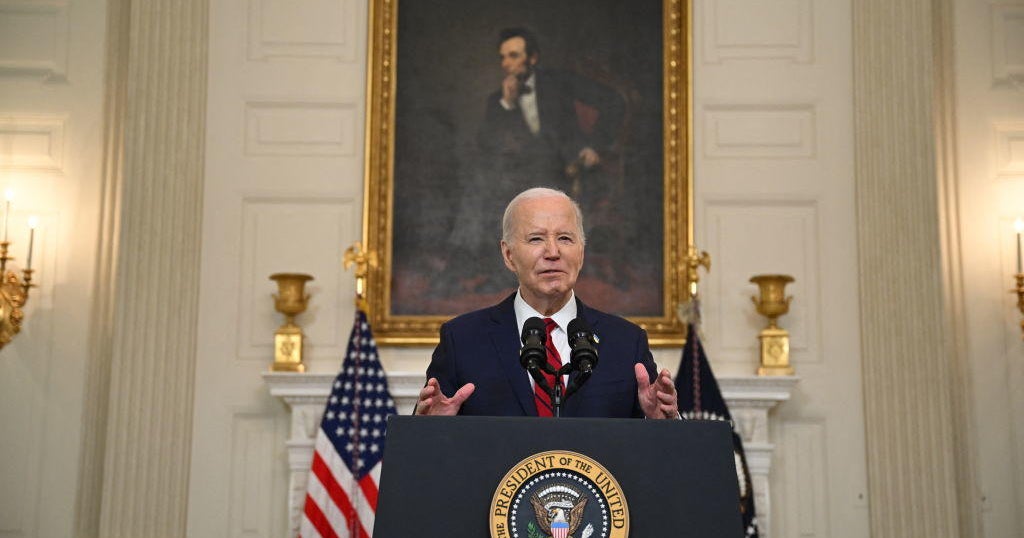Biden expands Title 42 expulsions while opening legal path for some migrants
Washington — President Biden on Thursday announced a revamped migration management strategy that pairs increased expulsions with expanded opportunities for migrants to enter the country legally, in an attempt to reduce record levels of unlawful crossings along the U.S.-Mexico border.
The multi-pronged effort, which follows a "carrots and sticks" approach, will allow migrants from Nicaragua, Cuba and Haiti with U.S.-based financial sponsors to enter the country legally through a program modeled after Biden administration policies that have offered a safe haven to displaced Ukrainians and Venezuelans.
After passing background checks, eligible migrants from these crisis-stricken countries would be allowed to enter the U.S. under the humanitarian parole authority, which allows beneficiaries to live and work in the U.S. legally on a temporary basis.
This expanded legal pathway, which would be capped at 30,000 admissions each month, would be paired with a deterrence measure designed to discourage illegal entries along the southern border. Migrants from Nicaragua, Cuba and Haiti would face immediate expulsion to Mexico under the Title 42 pandemic-era measure if they cross the U.S. border illegally. Officials said Mexico had consented to 30,000 monthly returns.
For over two years, the Mexican government only accepted the return of its citizens and migrants from Guatemala, Honduras and El Salvador expelled from the U.S. under Title 42, a public health law that was first invoked by the Trump administration in early 2020. But in October, the Biden administration convinced Mexico to accept Venezuelan migrants as part of a deal in which the U.S. committed to allowing up to 24,000 Venezuelans to enter the country legally under the parole authority.
The dual policies for Venezuelan migrants led to a dramatic drop in the number of Venezuelans entering U.S. border custody, and Biden administration officials pledged to "build on" on the strategy's success.
"We can't stop people from making the journey," Mr. Biden said during remarks at the White House. "But we can require that they come here in an orderly way under U.S. law."
While Mr. Biden said the new effort will allow his administration to better manage the historic migration flows along the southern border, he conceded it was a short-term fix, calling on Congress to revamp the U.S. immigration system, which has not been updated since the 1990s.
"The actions we're announcing today will make things better," Mr. Biden said, "but will not fix the border problem completely."
The Biden administration announced additional border-related measures on Thursday, including a proposed regulation that would disqualify migrants from asylum if they crossed the U.S. border illegally after failing to ask for protection in a third country, like Mexico. If enacted, the proposal would allow U.S. border officials to rapidly deport migrants subject to the restriction, even after Title 42 is lifted.
Officials also said they would expand the use of a process known as expedited removal to quickly deport migrants who are not processed under Title 42. The policy, dating back to the 1990s, allows the U.S. to deport migrants without a court hearing if they do not seek asylum or fail to establish credible fear of persecution.
The Department of Homeland Security said it would increase processing of vulnerable asylum-seekers along the U.S.-Mexico border by allowing those migrants to request appointments to enter the country legally at ports of entry through a mobile app. The process will initially allow migrants determined to be vulnerable to request exemptions to Title 42 and will remain in place after the measure is lifted. Migrants processed at ports of entry would be allowed to work in the U.S. legally.
The expansion of Title 42 to include migrants from Cuba and Nicaragua will be a seismic shift in U.S. policy, as the vast majority of the tens of thousands of Cubans and Nicaraguans processed along the southern border over the past year have been released and allowed to seek asylum because their home countries severely limit U.S. deportations.
Mass exoduses from Cuba and Nicaragua have contributed to record levels of U.S. border apprehensions in the past year. In recent months, arrivals from these countries have surpassed the number of Guatemalan, Honduran and Salvadoran migrants entering U.S. border custody, an unprecedented demographic change.
The new effort would also represent a dramatic and unprecedented expansion of the parole authority, which the Biden administration has already used to resettle tens of thousands of refugees from Afghanistan and Ukraine.
U.S. law allows immigration officials to use the parole authority to admit immigrants who otherwise don't have legal permission, such as a visa, to enter the U.S., if their entry is deemed to be justified on humanitarian or public interest grounds.
The humanitarian crisis along the southern border has become a political liability for Mr. Biden, who has been accused by Republicans of ignoring the issue. They've also argued the record border arrivals reported over the past two years stem from the Biden administration's decision to reverse some Trump-era policies, including a program that required certain migrants to wait for their asylum hearings in Mexico.
In fiscal year 2022, U.S. Border Patrol agents stopped migrants 2.2 million times along the southern border, an all-time high that surpassed the record set the previous year, federal figures show. More than 1 million of those encounters resulted in migrants being expelled from the U.S. under Title 42.
While it revoked some of the Trump administration's asylum restrictions, the Biden administration maintained Title 42 for over a year, defending the Trump-era argument that the policy was needed to control the spread of COVID-19.
In April 2022, the Centers for Disease Control and Prevention said it would stop authorizing Title 42 due to improving pandemic conditions, including higher vaccination rates. But a group of Republican-led states convinced a federal judge in Louisiana to block the rule's termination on procedural grounds.
Then, on Nov. 15, another federal judge declared Title 42 unlawful, saying the CDC had not properly explained the policy's public health rationale or considered its impact on asylum-seekers. At the request of the Biden administration, the judge gave border officials 5 weeks, until Dec. 21, to end Title 42.
Nineteen Republican-led states asked several courts to delay Title 42's rescission indefinitely, warning that chaos would ensue otherwise. On Dec. 27, the Supreme Court said it would suspend the lower court order that found Title 42 to be illegal until it decided whether the Republican-led states should be allowed to intervene in the case, likely postponing the policy's termination for months.
Immigration experts said Mr. Biden's speech, and the measures he announced, showed his administration wants to prioritize border security in 2023. Mr. Biden is also set to visit El Paso, Texas, on Sunday for his first trip in office to the U.S.-Mexico border.
"They're finally taking the border seriously," said Andrew Selee, president of the Migration Policy Institute, a nonpartisan think tank. "I think they realized it can create a crisis of credibility if there isn't a perception that they're managing the border well."
Selee said the combination of increased enforcement and expanded migration avenues would likely lead to a reduction in migrant arrivals along the southern border, at least in the immediate future. But he said the parole component could be blocked in court if Republican-led states file a lawsuit against it, just like they have challenged other major Biden administration immigration policies.
"There's a vulnerability in this, which is it's not what parole was intended for. And there's no end point for people who come into the country on parole to get long-term legal status," Seele said. "But on the other hand, it is a creative solution at a time when Congress hasn't been able to agree on expanding legal pathways."
Theresa Cardinal Brown, a former DHS immigration policy official under Presidents Barack Obama and George W. Bush, said Thursday's announcement represented the Biden administration first "comprehensive strategy to manage the border." But she also expressed concern the strategy mainly relies on the continued enforcement of Title 42, a temporary measure the CDC has said can no longer be justified on public health grounds.
"We shouldn't be relying on a public health order to enforce immigration law. That's what they're doing," Cardinal Brown said.
In addition to criticism from Republicans, Mr. Biden's border policies have faced significant pushback from progressives and advocates for asylum-seekers, who say he has not fully complied with asylum law, which allows migrants on U.S. soil to request protection as a way to stop their deportation.
While they praised the expansion of legal pathways unveiled Thursday, human rights groups, advocates and some Democrats denounced the expansion of Title 42 and the proposed asylum eligibility restriction, which resembles a Trump administration rule that was struck down in court.
"Republicans should be held accountable for their lack of action on immigration and the border and the president is doing what he can within his executive authority to manage migration," Tyler Moran, who was Mr. Biden's senior adviser for migration until early 2022, told CBS News. "But any bans on asylum are simply a continuation of the failed policies of the last administration."
Democratic New Jersey Sen. Bob Menendez, meanwhile, said, "The Biden Administration's decision to expand Title 42, a disastrous and inhumane relic of the Trump Administration's racist immigration agenda, is an affront to restoring rule of law at the border."







